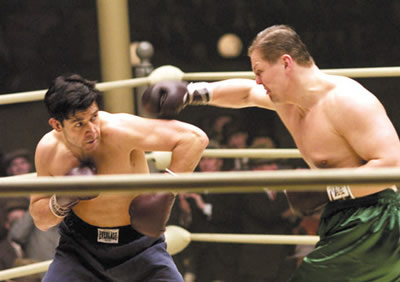When 25 percent of Americans were jobless during the Depression, Jim
Braddock made a nation cheer. Cinderella Man is not a movie about
boxing, but about this boxer who personified the heart and hope of 1935.
 Although the "Bulldog of Bergen," as the Jersey pug was also
nicknamed, roared through the '20s, in 1929 he tumbled quicker than the
stock market. Hands and spirits broken, he scrambled for work as a day
laborer to support his wife and three children. In movie terms, Braddock
was Seabiscuit - a nose away from the glue factory.
Although the "Bulldog of Bergen," as the Jersey pug was also
nicknamed, roared through the '20s, in 1929 he tumbled quicker than the
stock market. Hands and spirits broken, he scrambled for work as a day
laborer to support his wife and three children. In movie terms, Braddock
was Seabiscuit - a nose away from the glue factory.
If Braddock's improbable comeback is the core of Ron Howard's
exhilarating film, Russell Crowe is its juicy apple. The actor's
stinging simplicity and quiet urgency recall Spencer Tracy at his
humblest and most titanic.
Crowe's gravity is relieved by Paul Giamatti as wisecracking manager
Joe Gould, a hard-boiled egg in a plaid suit. And he is ably abetted by
Renee Zellweger as the fighter's scrappy helpmeet, Mae, equal parts
Betty Crocker and Betty Boop - that is to say, a kewpie doll who cooks.
However tempting it is to dub him the "Raging Bulldog," Crowe's Jim
Braddock is anything but. This fighter is a man who can't control the
economy or his kids but can control himself.
According to the film, even when the broken-down boxer could not
afford to maintain his pride, he retained his decency: Reduced to
begging nickels from boxing promoters, Braddock makes his hungry son
return a stolen salami. He accepts welfare, but returns every penny when
he can.
Despite the fairy-tale title (a moniker thrust on the reluctant
Braddock by sportswriter Damon Runyon) Cinderella Man is the dun
color of smudge and soot and sweat, thanks to the understated art
direction of Wynn Thomas and cinematography of Salvatore Totino.
Director Howard may be a silver-lining kind of guy, but this time out,
in his most ambitious film as well as his most fully realized, he
doesn't shrink from the cloud.
His film's subdued tone has the effect of deglamorizing the era more
often celebrated for its fashion and music (see Seabiscuit and
The Aviator) than for the perseverance and determination of people
like Braddock.
Drawn to American profiles in courage like Apollo 13 and A
Beautiful Mind, Howard invests Braddock with the bedrock virtues of
self-reliance and parental fortitude, values that resonate across the
political and social spectrum. Most boxing movies use the ring as a
metaphor. Rocky and Million Dollar Baby are about nobodies
fighting to become somebodies; The Great White Hope and Ali
are about black champions fighting white prejudice. This one is about an
unassuming guy fighting to put food on the breakfast table.
The conventional wisdom is that Howard is a sentimentalist who needs
Crowe to give his films edge. I prefer to think of the director as one
in the handful of Hollywood filmmakers who still know how to make mass
entertainment not based on a comic book.
As with A Beautiful Mind, Howard will probably be accused of
sanitizing Braddock's story. The boxer was not quite the angelic family
man as he's shown here. (He owned a speakeasy and did, at one point,
farm out his kids to relatives.)
Nor was his ring adversary Max Baer (played by a ferociously
charismatic Craig Bierko) quite as diabolical as screenwriters Akiva
Goldsman and Cliff Hollingsworth would have us believe.
I don't look to movies for biographical accuracy (if I did, then I
would have to put disclaimers on The Aviator, Ray and
Hotel Rwanda); I look to them for biographical drama. In this,
Cinderella Man excels.
That the movie packs such an emotional wallop is largely due to
Crowe, who digs deeper into himself with every movie and takes us with
him. In a movieland of eternal boys like Adam Sandler and Tom Cruise and
Tom Hanks, Crowe is the man in more ways than one.

